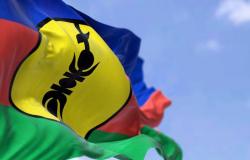
The representative’s objective: to make young people understand Europe so that they “can determine with full knowledge of the facts.” A difficult task. “OThere are a lot of problems explaining Europe, there is a lot of false information. The idea is therefore to exchange with them and go back to basics, to educate and give concrete examples to break all the myths that we can hear about Europe.“, explains the head of representation.
Beyond Europe, it is also about “make people understand the importance of voting within a democracy” even if “it is not in an hour that they will have all the keys, recognizes Valérie Drezet-Humez. “But I hope it makes them want to dig, to look and not just stop at the false information they see on social networks.
Sensitive subjects
Although the students do not really know how the European institutions work, they understand the main principles and their questions quickly address political issues.
“Is Europe militarily independent?“, asks a high school student after a few minutes. In response, the representative emphasizes the importance of NATO* (North Atlantic Treaty Organization which brings together 29 countries of the European continent, the United States, Canada and Turkey to cooperate and assist each other in matters defense). “Are we dependent on NATO? Is there a plan for a European army? retorts the student, immediately.
“Isn’t opposing the common good to 27 and sovereignty (especially food) a caricature?” asks a student with long hair. This time, the answer comes through the Common Agricultural Policy (CAP), established by the European Union in 1962 to support farmers and maintain affordable prices for populations.
“We vote for lists, but what is a list?”, “Why, who to vote for?” ask other pragmatic people. The class comes alive, even if some remain outside the discussion, like this sleeping student in the front row, who snores lightly.
Gaza: the essential subject
In the back row, a student raises his hand for the first time and asks: “Who are our allies and our enemies?” Answer regarding allies: states that respect human rights. “But Israel doesn’t respect human rights?” he reacts quickly. Enough to liven up the mood. “Is there a plan for sanctions against Israel, like what was done with Russia?” he continues. Sanctions similar to those imposed on Moscow are not envisaged, the representative begins to respond. The student interrupts: “There are 34,000 deaths and still no sanctions?” In the class, his classmates seem to share his reaction. This time, it’s a high school teacher who reacts. “The European Union and the United Nations should not be confused”, she clarifies, before inviting us not to forget the attacks of October 7, 2023 perpetrated by Hamas in Israel, and pointing out that the situation in Ukraine cannot be compared with that in Gaza.
Need something concrete
Faced with the students, the Commission representative also tries to “show that Europe is something very everyday and concrete which makes it possible to support the personal and professional projects of young people.” And to mention the Erasmus + program for studying in another European country, or the Interrail pass for traveling.
At the end of the intervention, however, Benoît remains circumspect. “They take directives, but I don’t see the effect“, he says. “Yes, we don’t really see the effect that it has on us, we should have information on the projects that the Union finances for example“, adds Thomas. “We imagine that there is funding, but, in fact, we do not hear much about this or that project being financed by Europe.” Erasmus? “We knew about it but we’re not really interested in it, we’ll have to see in the years to come”comments Thomas.
To go deeper, Valérie Drezet-Humez invites “all young people to go see the European youth portal which shows them all of these opportunities.” The students had never heard of this portal. Will they go?
“If we had the right to vote (at the time of the European elections on June 9) we would probably talk about it more with our parents, but as I know that I am not going to vote that is not the case”testifies Benoît.





